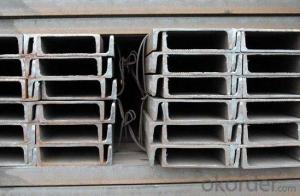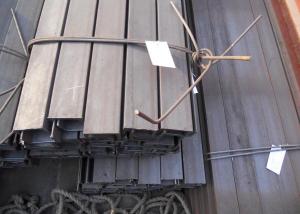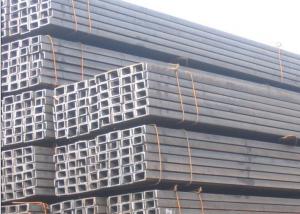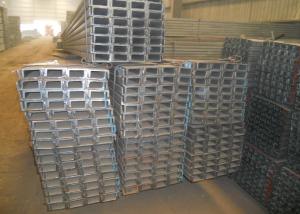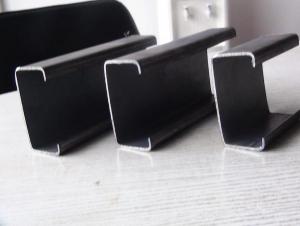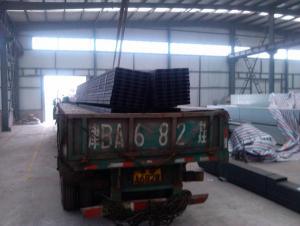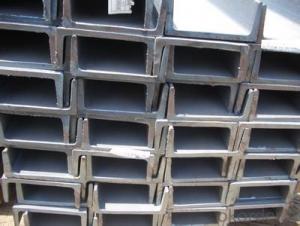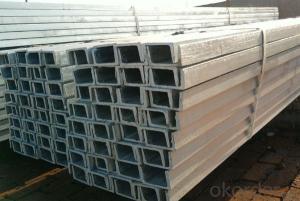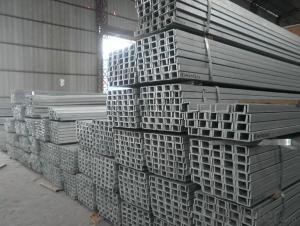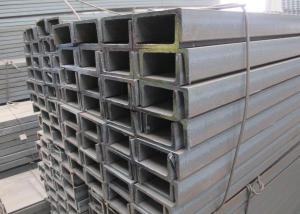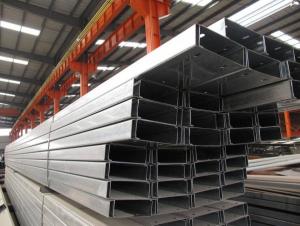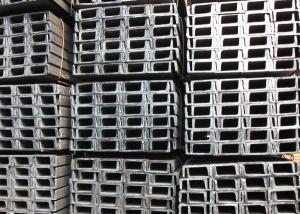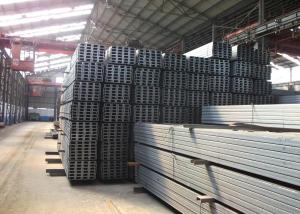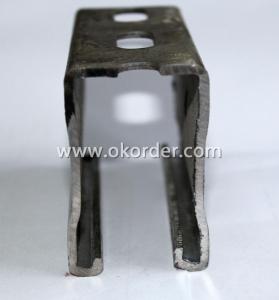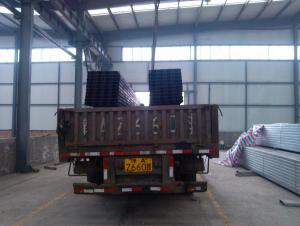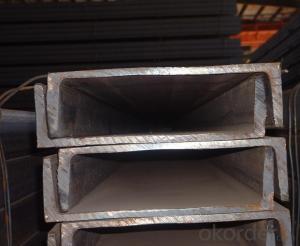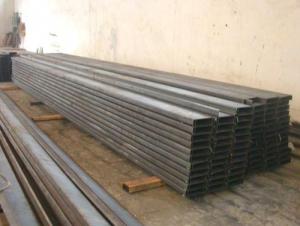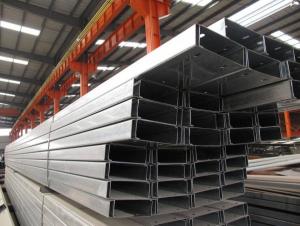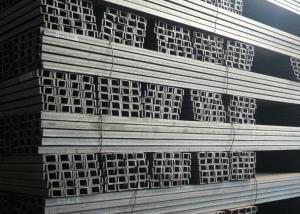GB Standard Steel Channel 200mm with High Quality
- Loading Port:
- China Main Port
- Payment Terms:
- TT or LC
- Min Order Qty:
- 25 m.t
- Supply Capability:
- 10000 m.t/month
OKorder Service Pledge
OKorder Financial Service
You Might Also Like
Product Description:
Specifications of GB Standard Steel Channel 200mm with High Quality:
1. We are definitely specializing in manufacturing and supplying channel steel.
| Standard: | GB/T 6723-86 |
| Sizes: | 200mm |
| Sales Volume/Year: | 10000MT |
| Destination Area: | Middle East, Africa, Southeast Asia |
2.Size, Length and Mass.
| Size(mm) | Length(m) | Mass(Kg/m) |
200*98*4 mm | 6m, 12m | 11.932 kg/m |
| 200*98*5 mm | 6m, 12m | 14.719 kg/m |
| 200*98*6 mm | 6m, 12m | 17.568 kg/m |
| 200*98*8 mm | 6m, 12m | 23.048 kg/m |
Package & Delivery of GB Standard Steel Channel 200mm with High Quality:
The steel u channel will be packed in bundle with steel wire at each end of every bundle and color marking in order to help the customer to recognize his goods more easily at sight.
And steel u channel could be loaded into 20ft or 40ft container, or by bulk cargo. If the weight of each bundle reaches less than 3.5 mt, the loading by break bulk cargo should be choosed. When the weight of each bundle reaches less than 3mt, the loading by container should be choosed.
As for the transportaion from mill to loading port, the truck will be usually used. And the maximum quantity for each truck is 40mt.
All in all, we could do in accordance with customer's request.
FAQ:
Q1: How soon can we receive the product after purchasement?
A1: Within three days of placing an order, we will begin production. The specific shipping date is dependent upon international and government factors, but is typically one month.
Q2: How do you guarantee the quality of our products?
A2: We have established an advanced quality management system which conducts strict quality tests at every step, from raw materials to the final product. At the same time, we provide extensive follow-up service assurances as required.
Q3: The prices are invoicing on theoritical weight or on actual weight?
A3: We can do it in both manners, according to the customers' request.
Images of GB Standard Steel Channel 200mm with High Quality:
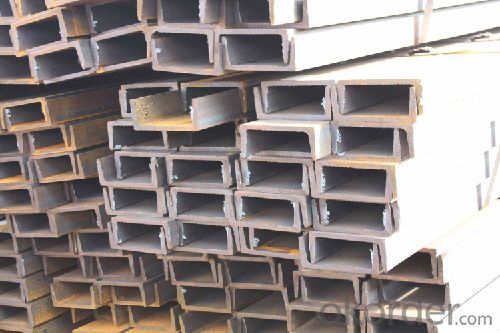
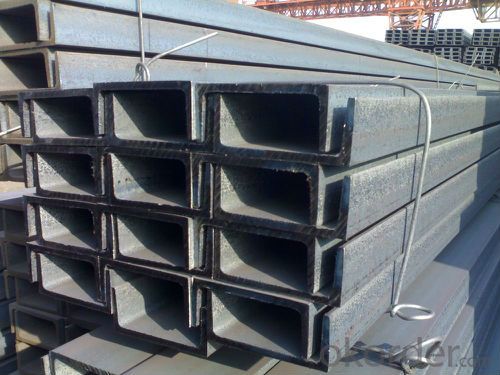
If you would like to get our price, please kindly inform us the standard/material, size and quantity. Thank you very much.
- Q:What is the weight of steel channels?
- The weight of steel channels can vary depending on the size and thickness of the channel.
- Q:Can steel channels be used for architectural purposes?
- Yes, steel channels can be used for architectural purposes. Steel channels are versatile and can be utilized in many architectural applications such as the construction of building frames, support structures, and architectural facades. They provide strength and stability to the overall structure, making them ideal for architectural projects where durability and load-bearing capacity are important considerations. Steel channels also offer flexibility in design as they can be easily fabricated and customized to meet specific architectural requirements. Moreover, their sleek and modern appearance can enhance the aesthetic appeal of a building, making them a popular choice among architects and designers. Overall, steel channels are a reliable and practical option for architectural purposes.
- Q:Are steel channels suitable for high-temperature manufacturing processes?
- Steel channels are generally suitable for high-temperature manufacturing processes. Steel is known for its excellent heat resistance and can withstand high temperatures without significant deformation or structural damage. Furthermore, steel channels are often used in applications where temperature fluctuations are common, making them a reliable choice for high-temperature manufacturing processes. However, it is crucial to consider the specific type of steel used and its composition when determining its suitability for high-temperature manufacturing processes. Different steel alloys have varying melting points and heat resistance properties. Specialized alloys such as stainless steel or heat-resistant alloys like Inconel are commonly preferred for extremely high-temperature applications. Additionally, it is important to consider the specific requirements of the manufacturing process. Factors such as the duration of exposure to high temperatures, the presence of corrosive substances, and the need for thermal expansion must be taken into account. Consulting with a materials engineer or a steel supplier with expertise in high-temperature applications can help ensure the selection of the most suitable steel channel for specific manufacturing processes.
- Q:What are the typical applications of steel channels?
- Steel channels are widely utilized in a variety of industries, thanks to their strong structure and versatility. They have numerous applications, including: 1. Construction: Steel channels are commonly employed in construction projects for framing, support beams, and bracing. They offer structural stability and can bear heavy loads, making them ideal for constructing buildings, bridges, and other infrastructure. 2. Manufacturing: The manufacturing industry frequently uses steel channels to create industrial equipment, machinery, and conveyors. They can be easily welded or bolted together to form robust frames or support structures. 3. Electrical and Telecommunications: In the electrical and telecommunications sector, steel channels are often used for cable management and support. They serve as reliable raceways for electrical wires, conduits, and communication cables, ensuring secure and organized installations. 4. Automotive Industry: Steel channels play a crucial role in the automotive industry, where they are used to manufacture car frames, chassis, and suspension systems. Their high strength and durability contribute to the structural integrity and overall safety of vehicles. 5. Furniture and Shelving: Steel channels are commonly incorporated into the production of furniture and shelving units. They are utilized to construct frames, supports, and brackets for various types of furniture, such as desks, tables, and storage racks. 6. Solar Panel Mounting: Solar panel mounting systems often make use of steel channels. They provide a durable and stable support structure for the panels, ensuring they remain securely positioned and capable of withstanding various weather conditions. 7. Marine and Offshore: Steel channels are extensively utilized in marine and offshore applications due to their corrosion resistance and strength. They are employed in shipbuilding, offshore platforms, and marine structures where durability and reliability are of utmost importance. 8. Agricultural Equipment: Steel channels are also applied in the agricultural sector to build machinery and equipment such as tractors, plows, and harvesters. They provide the necessary strength and rigidity to withstand the demanding conditions of agricultural operations. In conclusion, steel channels are an indispensable component in numerous industries that require strength, durability, and versatility. Their applications range from construction and manufacturing to electrical installations, automotive manufacturing, furniture production, and more.
- Q:What are the different types of fasteners used for steel channels?
- There are several different types of fasteners that can be used for steel channels. 1. Bolts: Bolts are a common choice for fastening steel channels. They typically have a threaded shank and a flat head or a nut that can be tightened to securely hold the channel in place. Bolts come in various sizes and materials, including stainless steel, carbon steel, and galvanized steel, allowing flexibility in choosing the appropriate bolt for the specific application. 2. Screws: Screws are another popular option for fastening steel channels. They have a threaded body and a pointed tip, which allows them to be easily driven into the metal. Self-tapping screws are commonly used with steel channels as they can create their own threads, eliminating the need for pre-drilling holes. 3. Nuts and washers: Nuts and washers are often used in conjunction with bolts to provide added stability and prevent the bolt from loosening over time. Nuts are threaded and can be tightened onto the bolt, while washers are flat discs that distribute the load and protect the surface of the channel. 4. Rivets: Rivets are permanent fasteners that are commonly used to join steel channels. They consist of a cylindrical shank with a head on one end and a tail on the other. The tail is inserted through pre-drilled holes in the channels and then deformed, creating a secure connection. Rivets are often used in applications where disassembly is not required. 5. Welding: Welding is a method of joining steel channels by melting the edges and fusing them together. It provides a strong and permanent connection, but it requires specialized equipment and expertise. Welding is commonly used in structural applications where high strength and rigidity are required. These are just a few examples of the different types of fasteners that can be used for steel channels. The choice of fastener depends on factors such as the load requirements, the type of channel, the desired level of permanence, and the available tools and equipment. It is important to carefully consider these factors and consult with professionals to ensure the appropriate fastener is selected for each specific application.
- Q:Can steel channels be used for cable management?
- Yes, steel channels can be used for cable management. They provide a durable and sturdy solution for organizing and protecting cables in various applications.
- Q:What is the typical lifespan of steel channels?
- The typical lifespan of steel channels can vary depending on several factors including the quality of the steel used, the environment in which they are installed, and the level of maintenance they receive. However, on average, steel channels can have a lifespan ranging from 20 to 50 years. Steel channels are commonly used in construction and industrial applications due to their durability and strength. They are designed to withstand heavy loads and provide structural support. However, over time, steel channels may be subject to corrosion, wear and tear, and other forms of degradation. The lifespan of steel channels can be extended through regular maintenance and protective measures. This includes routine inspections, cleaning, and applying protective coatings or treatments to prevent corrosion. Additionally, proper handling, installation, and load management can also contribute to prolonging their lifespan. It is important to note that the specific lifespan of steel channels can vary based on the specific conditions they are exposed to. For instance, steel channels installed in coastal areas with high levels of saltwater exposure may experience accelerated corrosion and a shorter lifespan compared to those installed in more inland regions. To determine the expected lifespan of steel channels in a particular application, it is recommended to consult with structural engineers, manufacturers, or industry experts who can provide insights based on the specific requirements and conditions of the project.
- Q:What are the common challenges in the installation of steel channels?
- There are several common challenges that can arise during the installation of steel channels. Firstly, ensuring proper alignment and positioning of the channels can be a challenge. Steel channels need to be accurately placed and leveled to ensure the structural integrity of the installation. Any misalignment can lead to issues such as uneven load distribution or reduced strength. Secondly, the weight and size of steel channels can pose logistical challenges. These channels are often heavy and require specialized equipment or machinery for handling and installation. Lack of proper equipment or expertise can lead to delays or accidents during the installation process. Another challenge is the need for proper fastening and connection of steel channels. It is crucial to use appropriate fasteners and techniques to securely attach the channels to the supporting structure. Failure to do so can result in weak connections, which can compromise the stability and safety of the installation. Furthermore, environmental factors can also pose challenges during the installation of steel channels. Weather conditions such as extreme temperatures, high winds, or heavy rain can affect the installation process. Special precautions may be required to protect the channels from corrosion or damage caused by exposure to the elements. Lastly, coordination and communication among the installation team members are essential to ensure a smooth installation process. Proper planning, clear instructions, and effective teamwork are vital to overcome any challenges that may arise during the installation of steel channels. Overall, while the installation of steel channels offers numerous benefits in terms of strength and durability, it is crucial to be aware of and address these common challenges to ensure a successful and safe installation.
- Q:How do steel channels perform in seismic conditions?
- Steel channels perform well in seismic conditions due to their high strength and flexibility. The structural properties of steel make it resilient to ground motion, allowing channels to absorb and dissipate seismic energy. Additionally, steel's ductility helps channels withstand deformation without catastrophic failure, enhancing their overall performance in earthquake-prone areas.
- Q:How do steel channels perform in high-vibration areas?
- Steel channels are renowned for their exceptional strength and durability, rendering them suitable for a multitude of applications. In areas characterized by high levels of vibration, steel channels exhibit exceptional performance owing to their inherent stiffness and rigidity. The presence of vibration can induce structural instability and harm weaker materials; however, steel channels possess the capability to efficiently absorb and dissipate vibrations. This attribute is particularly crucial in settings such as industrial facilities, bridges, and heavy machinery installations, where vibrations are frequently encountered. Steel channels are designed to resist deformation and maintain their shape when subjected to dynamic loads, including vibrations. They boast high torsional and bending stiffness, thereby minimizing deflection and preserving structural integrity. Consequently, these channels can endure constant and repetitive vibrations without compromising their performance. Furthermore, vibration dampening techniques can be employed to further enhance steel channels. These techniques involve the utilization of specialized materials or coatings specifically crafted to absorb and diminish vibrations. By incorporating such measures, steel channels effectively alleviate excessive vibrations, ensuring the safety and longevity of the structure. In conclusion, steel channels are an exceptional choice for areas prone to high levels of vibration due to their innate strength, rigidity, and capacity to absorb vibrations. Their superior performance under dynamic loads, coupled with the potential utilization of vibration dampening techniques, renders them a reliable and enduring solution in such environments.
1. Manufacturer Overview |
|
|---|---|
| Location | |
| Year Established | |
| Annual Output Value | |
| Main Markets | |
| Company Certifications | |
2. Manufacturer Certificates |
|
|---|---|
| a) Certification Name | |
| Range | |
| Reference | |
| Validity Period | |
3. Manufacturer Capability |
|
|---|---|
| a)Trade Capacity | |
| Nearest Port | |
| Export Percentage | |
| No.of Employees in Trade Department | |
| Language Spoken: | |
| b)Factory Information | |
| Factory Size: | |
| No. of Production Lines | |
| Contract Manufacturing | |
| Product Price Range | |
Send your message to us
GB Standard Steel Channel 200mm with High Quality
- Loading Port:
- China Main Port
- Payment Terms:
- TT or LC
- Min Order Qty:
- 25 m.t
- Supply Capability:
- 10000 m.t/month
OKorder Service Pledge
OKorder Financial Service
Similar products
New products
Hot products
Related keywords
